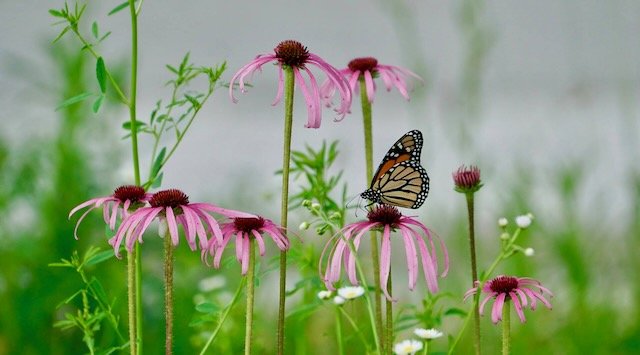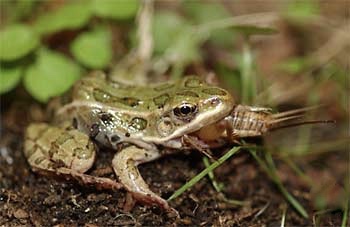Insects are by far the most common animals on the planet. Ironically, the majority of these have yet to be discovered and named by scientists! Most people make it a high priority to minimize contact with the insect world, but this is hard to do since four out of every five animals on earth have six legs at some point in their life and are found just about every place humans live.
While they may be unwelcome inside our homes, before you pick up the insect spray, remember that insects are crucial to our ecosystems. Most insects are not pests. Think of them as underappreciated partners in creating the way of life that we enjoy.
First of all, they are both the eaters and the eaten as they provide critical services as pollinators, undertakers, leaf-litter sweepers, garbage collectors, soil conditioners, and natural fertilizer producers. The following is a short list of the critical roles insects play:
Adult Southern Leopard Frog eating prey.
INSECTS ARE FOOD FOR LIFE
As a valuable food source for birds, reptiles, fish, mammals, amphibians, and each other, they are an essential part of the food chain. If insects disappeared, many other species would also be wiped out.
For many thousands of years, insects have also been food for people. Did you know that 80% of the world’s population eats insects as a regular part of their diet? Having lots of protein and hardly any fat, insects are looked at by scientists as a food of the future!
Pollinating insects are estimated to provide one out of every three mouthfuls of our food (more for vegetarians) and they get little credit for this service. In addition, the vast majorities of all flowering plants are pollinated by insects and have evolved countless colors, shapes, and scents to attract them. These feasts for our senses have inspired poets, writers, artists, and gardeners for centuries.
Dung Beetle rolling bits of manure.
INSECTS ARE CONTINUOUS RECYCLERS
Many insects feed on leaves, dead plants and animals, and animal manures. They break them down into nutrients that fertilize the soil. Without insects to help break down and dispose of wastes, dead animals and plants would accumulate in our environment and make things very unpleasant!
Dragonfly eating a mosquito.
INSECTS HELP CONTROL INSECTS
Predatory insects help keep other insects in check. Gardeners appreciate predatory wasps laying eggs on tomato hornworm caterpillars to keep them from destroying tomato plants, and ladybugs are welcome to dine on aphids any place in the garden. Taking a cue from nature, beneficial insects can be released to eat pests that are threatening an agricultural crop in order to prevent damage and reduce the use of chemical pesticides. In some cases, insects that eat certain weeds can be released to keep that weed from spreading!
Beyond these critical services, there are medicinal uses for insects from bee venom therapy to surgical maggots that can clean infected wounds. In addition, we unknowingly use insect products every day, such as honey from bees, silk from moths, dyes from scale insects for fabrics, cosmetics and food, and shellac from insect poop!
Insects make our world a more interesting and beautiful place! We have crickets and fireflies bringing sound and light to our evenings, while butterflies and bees enliven and make our days more colorful. In each place and habitat, even in our own backyard, a unique compliment of insects is waiting to be discovered.
To celebrate insects and their critical services we will be showcasing various insects at the Earth & Arbor Day Event, April 27, 2019. Stop by and check out water critters at 12:00.
For a summer time stroll, visit Redings Mill Bridge and enjoy the wildflower restoration project. Various native Missouri wildflower species will display during the warm months. You will most likely find many insects among the flowers and near the creek edges. At dusk, you just might encounter a bat. Look up at the utility pole and see if they have moved into their new bat house residence, recently installed by Chert Glades Chapter members. View our recent archived blogs for more information.
We hope you will worry with us about who will pick up the slack if 40% of all insect species are endangered over the next several decades as many researchers predict. Insects are definitely important!
By Valerie Frankoski - one of the founding members of Chert Glades Chapter in 2005, she has served as an officer, organized and led training for new members, and is currently Butterfly Coordinator for the chapter. She is involved with creating Monarch Waystations, guiding milkweed seed collection, and creating opportunities for planting milkweed and native nectar plants in the community. A former teacher, Val has volunteered in various capacities at the former Wildcat Glades and Audubon Center and is an obsessive gardener. She has almost never met a native plant she doesn't like.
Come to Joplin’s Earth & Arbor Day event on Saturday, April 27th
from 10AM – 1PM at Landreth Park
to learn more, get the tools you need, and have fun!
To discover some of the tiny water critters that reside in local streams and what they can tell us about water quality, join us at 12:00, April 27th, at the Earth & Arbor Day celebration in Landreth Park for a sample Biological Water Quality Testing Demo, stream side of Joplin Creek!
Find this event on Facebook and sign up for the 5K and the Stream side Litter Pickup Project:
https://www.facebook.com/events/2293821467563162/
Looking for your family or your group's Earth Day contribution? Team Up to Clean Up and Join The Forces to compete in the Earth & Arbor Day team litter cleanup event. Joplin Creek cleanup will be held at Landreth Park, on April 27, 2019. Form your team, learn more, and register here: https://bit.ly/2HIFRgr
Pitching in and cleaning up some trash is an easy way for anyone to help out.



